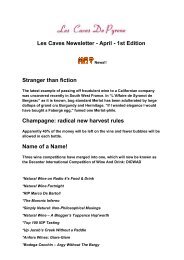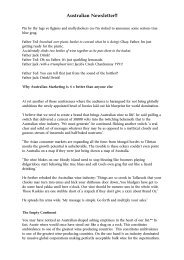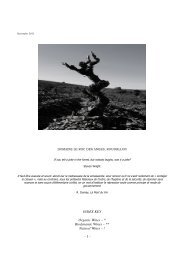Download our list here - Les Caves de Pyrene
Download our list here - Les Caves de Pyrene
Download our list here - Les Caves de Pyrene
You also want an ePaper? Increase the reach of your titles
YUMPU automatically turns print PDFs into web optimized ePapers that Google loves.
MARCILLAC & AVEYRONContinued…L’homme est le vin – Jean-Luc Matha“GET” MARCILLACIs t<strong>here</strong> a point in getting the wine? Un<strong>de</strong>rstanding something is necessarily constrained by the very limited linguistic frameworks withinwhich we operate. I do a lot of tutored tastings and I realise that although we may all use the same words in <strong>de</strong>scribing a wine we maymean quite different things by them. Language is an impure form of <strong>de</strong>scription: in tasting notes we use ten words w<strong>here</strong> one will do andwe never get close to the heart of the wine. Oh yes, we can anatomise every single <strong>de</strong>tail and pile up the adjectives, but the words are justcold echoes of the emotions we feel when we taste the wine. If you <strong>list</strong>en to classical music do you appreciate it more by pulling it apartintellectually or do you allow y<strong>our</strong>self to be swept up in the flow and feel it on the pulses? The time I get the wine (or the picture, or thepoem, or the music) is when I am least critical, least straining after meaning, then I don’t “get the wine” – it “gets me”. I also think,whilst we are in philosophic mo<strong>de</strong>, that the wine in the glass is only one stage in a complex transformative process. The so-calledobjective transformations are the result of what happens to the grapes in the vineyard and in the winery. But the final transformation isthe response to tasting the wine itself and w<strong>here</strong> that experience takes the individual taster. It is difficult to share these responses, as I’vementioned, because language is an insufficiently sensitive instrument. I admire Parker, for example, in one major respect. When he reallyloves a wine his <strong>de</strong>scriptive powers completely <strong>de</strong>sert him and the tasting note collapses in on itself; he’ll start gibbering and sayingWow! Tasting doesn’t just involve the usual “perceptive” senses; <strong>our</strong> sense of excitement, <strong>our</strong> sense of pleasure and <strong>our</strong> sense ofimagination brings the wine ineluctably to life. And that’s something worth getting.Back on terra firma points are the means w<strong>here</strong>by we codify “getting the wine”. The usual register is 100, although it effectively operatesat 80 and above according to some, or 50 and above according to others. Who establishes the criteria for marking and is the scaleremotely meaningful? Is t<strong>here</strong> a received wisdom concerning wine that we can <strong>de</strong>construct the various components that make it up andassess clearly and conscientiously the real value of what we are drinking?Critical approbation tends to focus on the lavishly ma<strong>de</strong> up wines: primped, pumped, souped up mo<strong>de</strong>ls. I don’t “get” these wines anymore than I get an expensive fake fur coat. My experience of wine competitions is that in a line-up of multiple wines of various styles thenuances are discar<strong>de</strong>d in fav<strong>our</strong> of the broad brush strokes.Disagreement is an important part of <strong>de</strong>bate. The way I taste is who I and what I like. Consequently, t<strong>here</strong> are wines that I find faultybecause I dislike them. For example, any wine which tastes acidified or alcoholic or sweetly toasted, w<strong>here</strong>in I can taste the interventionsat the expense of the fruit and essential flav<strong>our</strong> is, to my palate, faulty. I can’t imagine the winemaker admitting the fault – whichbecomes a neat paradox: the <strong>de</strong>sire to avoid faults in the wine is so great that it drives the winemaker into making meretricious, overelaboratedwines. The <strong>de</strong>sire to improve on nature and keeping on adding layers of flav<strong>our</strong> is the <strong>de</strong>sire to conform to a perceivedarchetype of what is good. The winemakers themselves are guilty in coaxing the wine fit the recipe.The sanguine wines of Marcillac remind us that less is more. As Eric is wont to ask: “Which is the wine that you would take home anddrink”? The <strong>de</strong>licious gutsy-sav<strong>our</strong>y wines of the Aveyron and Gaillac are a million miles away from the ramped up international cuvéeslying inertly in their oak coffins surroun<strong>de</strong>d by their trove of competition medals. The former get the juices flowing; the others clog <strong>our</strong>arteries. Wine does not have to be pretentious to be interesting; when we drink Marcillac we believe that simplicity is an un<strong>de</strong>r-ratedvirtue.- 30 -








